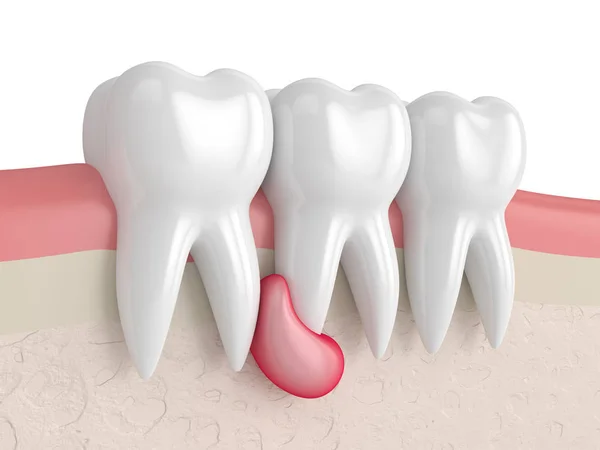Overview
A gum abscess, also known as a periodontal abscess, is a dental health disease in which pus accumulates in the gum tissues as a result of a viral or bacterial infection. Some people will try to treat this problem by popping the abscess. However, if not handled properly, this type of treatment can have catastrophic health implications, including death.
The following Article highlights the dangers of bursting a gum abscess and the importance of seeking immediate professional medical assistance.
What is a gum abscess?
A gum abscess is an infection of the gum tissue that results from the entrapment of bacteria in the gums, which may be due to:
- Poor oral hygiene, in which plaque and bacteria accumulate.
- Untreated dental caries, dental trauma that allows the entry of bacteria.
- The advanced gum disease that causes the weakening of gum tissues.
Symptoms of an abscess in the gums include the following:
- Severe pain in the gums.
- Swelling and redness of the affected area.
- Pus discharge with a foul taste.
- Fever or general malaise-severest cases.

The Danger of Popping the Gum Abscess
Trying to pop an abscess of the gums can introduce new bacteria, worsen an infection, or spread it to other parts of the body. Risks associated with this action are:
1. Risk of Sepsis
Sepsis is the name for an infection that sends your body into a tailspin, where it can become quite deadly. The bacteria will release into the blood by the time an abscess has been punctured using non-sterilized tools; it may consequently lead to systemic inflammation and organs failure.
2. Infection Spread
Bacteria from the gum abscess may migrate towards critical areas, including the heart, lungs, or brain, thereby complicating the condition into:
- Endocarditis is an infection of the inner lining of the heart.
- Lung abscesses: usually develop with the bacterial spread of the infection to the respiratory system.
- Brain abscess is a life-threatening infection in the brain tissues.
3. Increased Pain and Swelling
Popping usually doesn’t drain the whole abscess. It can be followed by further swelling, pain, and an increased risk of more residual infection and more abscesses forming.
4. Damage to Surrounding Tissue
Poor management of an abscess may lead to further complications, such as destruction of the gingiva, the teeth, or the underlying bone structure due to the infection.
Tartar Breaking Off Teeth | Causes, Effects, and Solutions
5-Day Prednisone Dosage for Poison Ivy
Why Treatment by Professionals Is Important
Dentists are specially prepared for the safe and effective treatment of gum abscesses. A professional approach may be demonstrated by the following:
- Incision and Drainage: Incision and Drainage Include the use of a sterile drainage to release the pus and pressure.
- Antibiotic Therapy: To eliminate the prevalent bacteria causing infection.
- Scaling and Root Planing: Deep cleaning in order to rid the teeth of bacteria and assist in healing.
- Surgical Intervention: This may involve surgery to treat more severe conditions that involve the gums or bones.
Home care while waiting to see a professional for treatment
If you suspect that you have a gum abscess and cannot see the dentist immediately, consider the following temporary measures to alleviate symptoms:
- Try rinsing your mouth with warm salt water, as this can help in reducing swelling and killing surface bacteria.
- Take over-the-counter pain relievers as instructed for discomfort.
- Avoid putting pressure on the affected area while chewing.
These measures can be relieving but do not replace professional care.
Long-Term Prevention of Gum Abscesses
Prevention of a gum abscess requires good oral hygiene and periodic dental checkups. Important practices include
- Brush your teeth at least twice a day with fluoride toothpaste.
- Flossing daily to remove plaque and debris from between teeth.
- Using an antibacterial mouthwash to reduce harmful bacteria.
- Scheduling cleanings along with dental checkups at least twice a year.
Early detection of the building of a dental problem, such as a cavity or gum disease, can also prevent an abscess from developing.
When to Get Emergency Care
Certain symptoms are indicative that an abscess of the gum is advancing into a more hazardous condition. Make sure to seek immediate medical attention if you have:
- Difficulty breathing or swallowing.
- High fever accompanied by heavy swelling.
- Persistent pain not improving.
- Signs of sepsis, rapid heartbeat, confusion, chills.
Conclusion
Trying to pop a gum abscess is ineffective and very dangerous. The risks of exacerbation of infection, sepsis, and destruction of surrounding tissues do not warrant any temporary relief. Professional dental consultations are definitely recommended on suspicion of a gum abscess. You will ensure good hygiene and, accordingly, long-term dental health, avoiding serious health consequences if you receive proper treatment.
